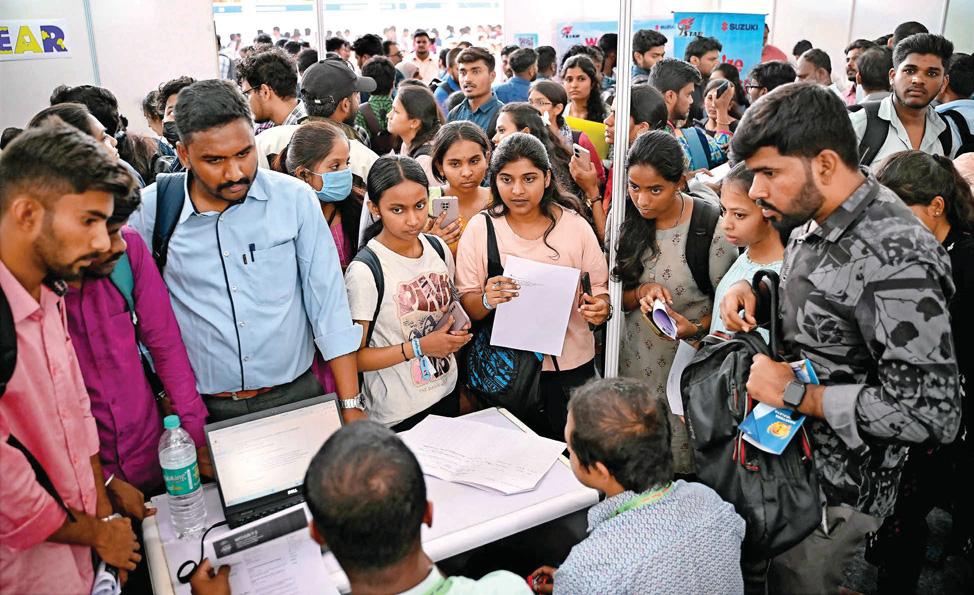
A FEW WEEKS AGO, the Reserve Bank of India published an article on the economy. The authors claimed that eight crore jobs had been created in India in the last few years and “there is no jobs crisis in India”.
It was an astounding statement, especially from a cautious, conservative and politically neutral institution like the RBI. The claim was lapped up by the BJP’s leaders, including the prime minister who mentioned it in one of his speeches.
The finance minister was silent. The chief economic adviser looked away. The NITI Aayog, that often sprang up to make bizarre claims, did not make any comment. No one asked the RBI questions such as how the claim was made, what kind of jobs were created, where were the jobs and who were the beneficiaries.
The RBI’s claim and the government’s tacit endorsement ran contrary to the evidence around us:
The Uttar Pradesh Police department conducted an examination to recruit 60,244 positions in the state police, mostly constables. More than 48,00,000 persons, including 16,00,000 women, wrote the examination. (The examination was cancelled after a few days).
Air India wanted to fill 2,216 vacancies of ‘handyman’, a job that involved diverse repair and maintenance duties. Some 25,000 persons thronged the Mumbai airport for a walk-in interview, and police had to step in to maintain order.
This story is from the {{IssueName}} edition of {{MagazineName}}.
Start your 7-day Magzter GOLD free trial to access thousands of curated premium stories, and 9,000+ magazines and newspapers.
Already a subscriber ? Sign In
This story is from the {{IssueName}} edition of {{MagazineName}}.
Start your 7-day Magzter GOLD free trial to access thousands of curated premium stories, and 9,000+ magazines and newspapers.
Already a subscriber? Sign In

Too Much Sitting Can Accelerate Ageing
SITTING FOR EXTENDED PERIODS can harm the heart and accelerate ageing, even if you are young and get the minimum recommended amount of daily exercise, according to a US study published in the journal PLOS One.

Efficiency and innovation
As health care evolves, professionals must employ innovative methods to refine their skills

Level up
Only 30 per cent of needy patients are able to undergo transplant in India; we need more dedicated transplant centres

HOPE STEMS FROM A CELL
While stem cell therapies have shown success in treating blood disorders, orthopaedic ailments, autoimmune diseases and eye issues, there is hope that they can one day treat patients with heart disease, blindness, Parkinson's, HIV, diabetes and spinal cord injuries

Mind matters
Your mindset can limit or expand your physical ability

Cutting edge
Would you go under the knife if a robot was the one holding it? Or would you say, \"No way, I need a human touch\"? You might have to decide soon because a robot that can imitate skilled human surgeons is already here.

The smallest cut
Minimally invasive surgeries have a bright future, with virtual reality and 3D procedures offering greater precision and AI on the horizon

Signalling a revolution
Canadian scientist and entrepreneur Sachdev Sidhu is focused on bringing cutting-edge antibody engineering to his country of origin

Wellness on demand
Starting as a doctor-patient chat platform, Medibuddy has evolved to be India's largest on-demand, full-stack digital health care platform

HEARING AND VISION LOSS LINKED TO HEART DISEASE AND STROKE
A CHINESE STUDY PUBLISHED IN THE JOURNAL of the American Heart Association suggests that middle aged and older adults with sensory impairments, specifically hearing and vision loss, have an elevated risk of cardiovascular diseases, including stroke and heart attacks.